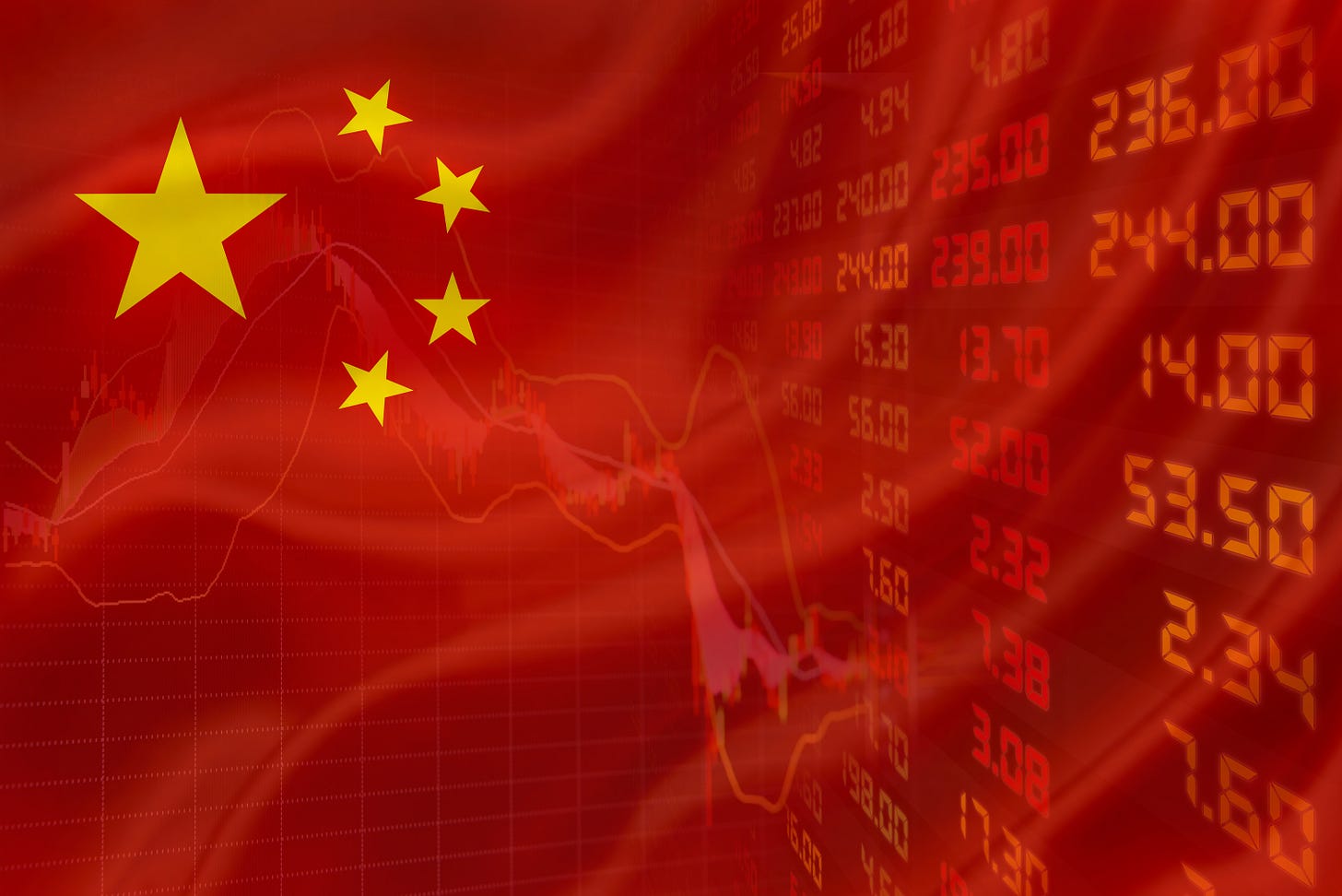We are on Borrowed Time
China is Too Big to Bail and Too Big to Fail
China’s third plenum is almost a declaration of economic war
Xi Jinping is doubling down on industrial policies that increase the risk of a global trade shock
Local governments raised half their revenues from land sales before the property bubble burst. This funding has collapsed, leaving them in various states of insolvency.
Professor Victor Shih, director of the 21st Century China Center in San Diego, says 12 of the 31 provinces have monthly debt service costs that exceed their monthly income, and all but four were over 50pc. By the end of 2022 the debt service ratio had reached 200pc in Tianjin, 188pc in Jilin, 176pc in Guizhou, and so on.
Prof Shih says “shadow” finance may have pushed local government debt alone to $15 trillion, or 90pc of GDP. If so, underlying debt dynamics in China are on a par with Greece, and catching up with Japan. Beijing is issuing special bonds to keep local government afloat but it dares not launch bazooka-scale stimulus.
Local governments are cutting the wages of civil servants to make ends meet. They are issuing “tight life” regulations to official agencies and bodies. Banks are retrenching too.
Pervasive angst is spreading through the middle class, hitherto shielded from the bouts of austerity dished out to migrant workers when times are hard. They borrowed to the hilt to get on the property ladder but are now caught in the double vice of falling incomes and falling home prices.
“Chinese society is like a pressure cooker that could explode at any time,” said Chen Yingxuan, a labour expert at Taiwan’s defence research institute. Source
Related:
Overcapacity and Price Wars - China’s deflationary spiral now entering a dangerous new stage



We must be close to the end game https://fasteddynz.substack.com/p/the-ultimate-extinction-plan-uep
You do not want to be alive when China goes down....
Why the West is worried Xi’s economic bazooka has misfired
If Beijing cannot raise China’s animal spirits, the world could feel the consequences
An estimated 6 trillion yuan (£650bn) “bazooka” of effectively free money pumped into China’s flagship stock market and financial system fired up a 30pc spike in shares – its biggest rally in 16 years.
Only 30 stocks in Shanghai’s 300-strong index failed to rise, while the MSCI China Index — a way for Western investors to own Chinese stocks – surged 34pc.
Billionaire investor David Tepper, founder of Appaloosa Management, said he was buying more of “everything” related to China while Ray Dalio, another US billionaire, said the move “could go down in the market-economic history books”.
Yet beneath the stock market froth lurks a more troubling question for China and the West.
President Xi, a leader who rarely takes decisions lightly, has made a bold gamble that by pumping huge amounts of liquidity into China’s system he can revive the country’s animal spirits and save the country.
So far, Chinese consumers are excited but if his big bazooka fails, it could risk a further spiral for the world’s second largest economy – and many Western countries that have hitched their wagon to China. A sugar rush is often followed by a crash.
“The big question is whether China can actually reignite this animal spirit for companies and households,” says Ng.
Global trade largely hinges on the prosperity of China, due to its large need for commodities such as iron ore used to make steel required for the country’s vast construction projects as well as its consumption of everything from medicines to luxury brands.
Donald Trump’s trade war with China triggered global economic jitters – and a self-inflicted wound on its own economy could have similar repercussions for growth.
The sudden policy blitz has been driven by the urgent need for China’s leadership to arrest the country’s rapid economic slide after a cataclysmic property crash.
Pan Gongsheng, the People’s Bank of China (PBOC) governor, unveiled a surprise slew of monetary reforms on Sept 24 including cutting bank deposit rates and measures to support the property sector.
In a hastily arranged conference broadcast live on Chinese television, Mr Pan said the measures would create a “good monetary and financial environment” for China’s battered economy.
The most eye-catching measure was an attempt to prop up China’s long-suffering stock market with 800bn yuan to support share buying.
Under the plan, Pan, a Cambridge graduate, is offering China’s banks 300bn yuan worth of cheap loans to help fund stock market purchases and 500bn yuan for funds and insurers to buy stocks.
Alongside the cash, China’s Politburo – the powerful 24-man Communist Party committee headed by Xi – issued a rare economic statement saying it would stop the real estate market from declining.
On Saturday, Chinese officials went even further, handing local governments cash to buy unused land and unsold homes, while China’s largest state-owned banks will also be given free money to boost their balance sheets.
At the market’s close on Friday, the main Shanghai index was down 3.3pc for the week as the rally fizzled out.
Some fear Xi’s stimulus is likely to fail as many Chinese consumers have become all too wary of the Politburo’s flip-flopping on economic policy.
“The party has a real economic problem on its hands with the decline of the property market, because they’ve lost a major driver of growth that has bubbled for 20 years,” says Andrew Collier, a senior fellow at the Harvard Kennedy School
“I find it ironic that a country that’s so authoritarian and has such a state-owned system is eager to get the animal spirits of capitalism to rejuvenate the economy.
“But they’re not doing anything structural, so people aren’t buying it. People said that they’re going to fire a bazooka – they fired a pop gun.”
https://www.telegraph.co.uk/business/2024/10/14/xi-jinping-tried-save-chinese-stock-market-risks/
https://archive.md/XLupq